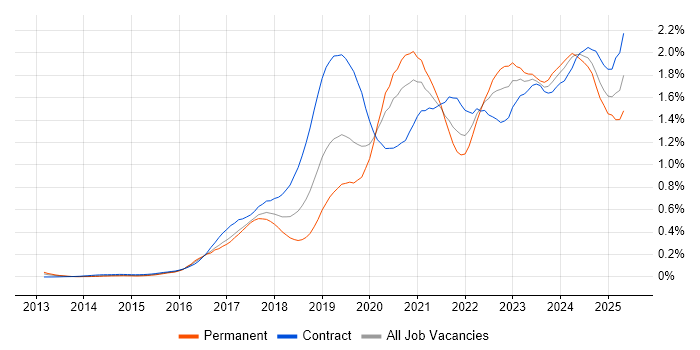Microsoft Azure Engineer
Central London > City of London
The median Microsoft Azure Engineer salary in the City of London is £82,500 per year, according to job vacancies posted during the 6 months leading to 30 May 2025.
The table below provides salary benchmarking and summary statistics, comparing them to the same period in the previous two years.
|
|
6 months to
30 May 2025 |
Same period 2024 |
Same period 2023 |
| Rank |
108 |
120 |
149 |
| Rank change year-on-year |
+12 |
+29 |
+60 |
| Permanent jobs requiring an Azure Engineer |
29 |
63 |
80 |
| As % of all permanent jobs advertised in the City of London |
1.50% |
1.89% |
1.78% |
| As % of the Job Titles category |
1.60% |
1.96% |
1.85% |
| Number of salaries quoted |
28 |
44 |
64 |
| 10th Percentile |
£59,575 |
£55,000 |
£42,500 |
| 25th Percentile |
£71,250 |
£61,250 |
£56,250 |
| Median annual salary (50th Percentile) |
£82,500 |
£70,000 |
£70,000 |
| Median % change year-on-year |
+17.86% |
- |
-6.67% |
| 75th Percentile |
£100,000 |
£85,625 |
£96,938 |
| 90th Percentile |
- |
£94,625 |
£100,000 |
| Central London median annual salary |
£82,500 |
£70,000 |
£71,500 |
| % change year-on-year |
+17.86% |
-2.10% |
-4.67% |
For comparison with the information above, the following table provides summary statistics for all permanent IT job vacancies in the City of London. Most job vacancies include a discernible job title that can be normalized. As such, the figures in the second row provide an indication of the number of permanent jobs in our overall sample.
| Permanent vacancies in the City of London with a recognized job title |
1,807 |
3,213 |
4,331 |
| % of permanent jobs with a recognized job title |
93.19% |
96.17% |
96.24% |
| Number of salaries quoted |
1,368 |
2,519 |
3,610 |
| 10th Percentile |
£41,250 |
£41,250 |
£42,225 |
| 25th Percentile |
£52,500 |
£53,875 |
£55,000 |
| Median annual salary (50th Percentile) |
£72,500 |
£73,441 |
£75,000 |
| Median % change year-on-year |
-1.28% |
-2.08% |
+3.45% |
| 75th Percentile |
£95,000 |
£95,000 |
£97,500 |
| 90th Percentile |
£120,000 |
£112,500 |
£115,000 |
| Central London median annual salary |
£72,500 |
£72,500 |
£74,744 |
| % change year-on-year |
- |
-3.00% |
+3.10% |

